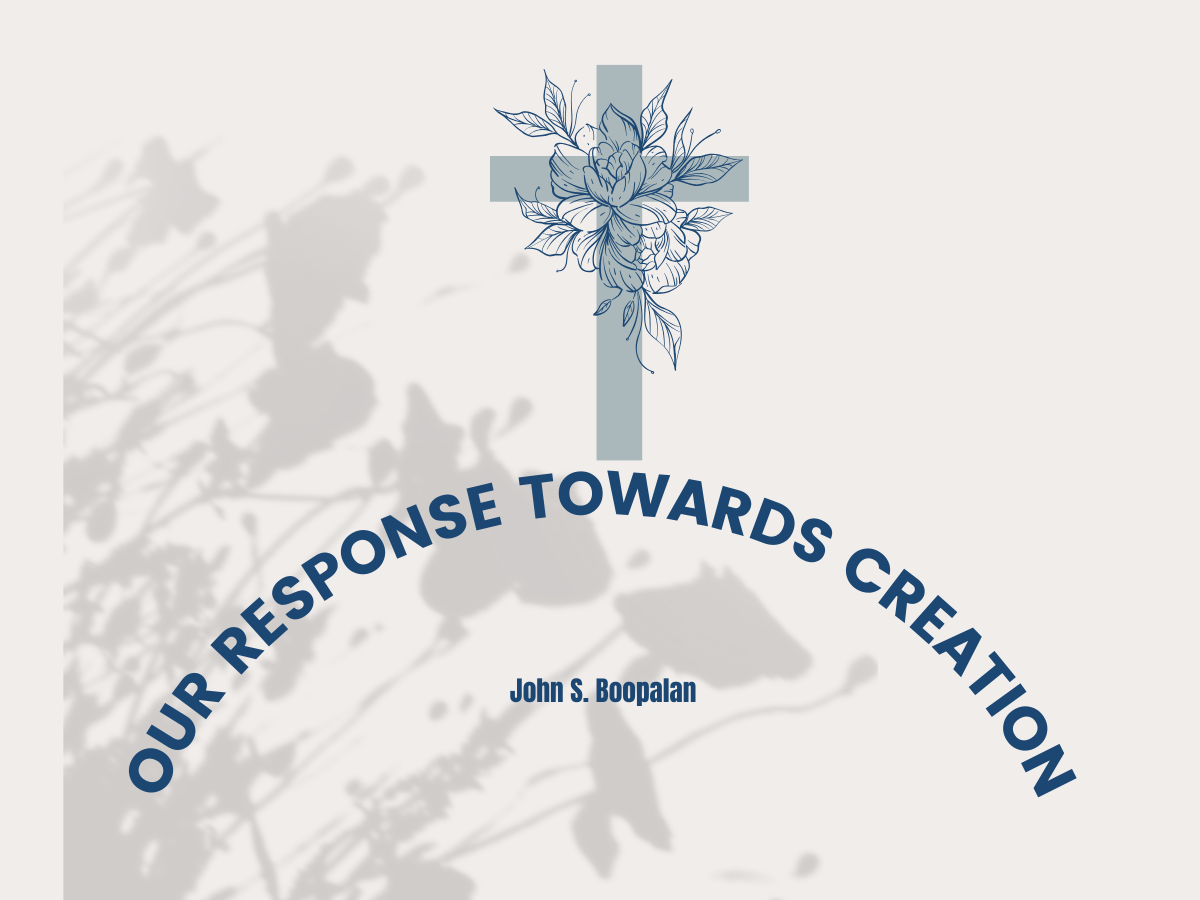
Our Response towards Creation
God blessed them and said to them, “Be fruitful and increase in number; fill the earth and subdue it. Rule over the fish of the sea and the birds of the air and over every living creature that moves on the ground”’ (Gen.1:28).
In the Genesis account of creation, the earth is teeming with life in all its diversity, and ‘God saw that it was good’. The living earth is entrusted to human rule, which does not mean a license to destroy, but the responsibility to protect, foster and nurture. This rule should resemble God’s rule, the rule of the Giver of Life, in whose image humans are created. ‘The LORD God took the man and put him in the Garden of Eden to work it and take care of it’ (Gen.2:15). The expression ‘rule’ is balanced and guarded against misunderstanding by the expression, in the second creation account, ‘to till’ (literally to serve) and ‘keep’ (or to protect) the garden. While there is no license to destroy, there is permission to use the garden for food. Initially this is limited to plants, later it includes animals (Gen.1:29-31; Gen.9:2-4).
The ultimate, utopian vision is that of non-violent nature, in which lamb and wolf, children and serpents, cow and lion peacefully live together (Isa.11:6-9). We tend to treat everything that we have not made ourselves, as valueless. There is a widespread belief that Nature’s resources are for humans to harness, appropriate and exploit for human welfare. To many, nature is largely inanimate. Increasing hydroelectric developments are altering the characteristics and dynamics of entire river ecosystems in that region. Sewage, industrial effluents, agricultural fertilizers and pesticides are polluting many wetlands.
Deforestation has resulted in habitat loss for some birds. Hunting is a major threat to some species. Sadly, value gets equated with the economic worth of nature, commodities and the access and control over them. Whose reference point, then, defines ‘value’? Earlier Christians may have been indifferent to nature as they were preoccupied with the salvation of their souls, as many other religious believers. But a re-reading of the Bible with the eco-crisis in mind brings out a close appreciation of nature in the context of a pre-modern society, and thorough warnings against the sinful voices of human arrogance and wealth accumulation, which can help in our present context, to develop an eco-friendly spirituality and ethos. What can we do?The ecology of care makes it clear that those entrusted with the cure of souls are entrusted with more than simply alleviating emotional or motivational difficulties.
They are also entrusted with helping to establish, maintain, and disseminate a cultural vision that will enable people to make meaningful commitments … Practitioners of the cure of souls must also project a cultural vision that deepens each person’s perceptions of the divine life, which ultimately empowers and bestows meaning upon the whole web of life. Some of the things that need to be taken seriously are: Examine foundational assumptions about basic reality, divine purpose, the good life, community, the human vocation and social tasks. We must call into question modern-era Christian theology’s anthropocentric theo-anthropology. We must take up the challenge of ecology and biology to Christianity to be clearer about common human duty to plants, species, ecosystems, and the earth as a whole.
The need for holistic responses to the environmental challenge that encompass both created reality and human subjectivity. Meeting eco-justice crisis places our social and religious integrity at stake. The importance of incorporating natural and social science understandings of ecology into theological education. Creation spirituality should base itself on a new grasp of God as immanent in creatures, conserving them, coordinating them, blessing them and re-creating them. We must see creatures as part of the earth and not just as mere beings on the earth. A little glance at the ‘Wisdom Psalms’ of the Bible throws open to us the vast area of God’s creation in its ‘exquisite splendor, infinite charm, pristine freshness and wonderful variety’. Apprehend God in all things, for God is in all things.
Every single creature is full of God and is a book about God. Every creature is a word of God. As we recognize that we are all part of God’s creation, we will truly learn to appreciate the beautiful pink of the flamingo, and the chirping of birds on a tree. We will then realize and appreciate the things that we have not created.
Author: Mr. John S. Boopalan is pursuing theological studies in UTC, Bangalore


